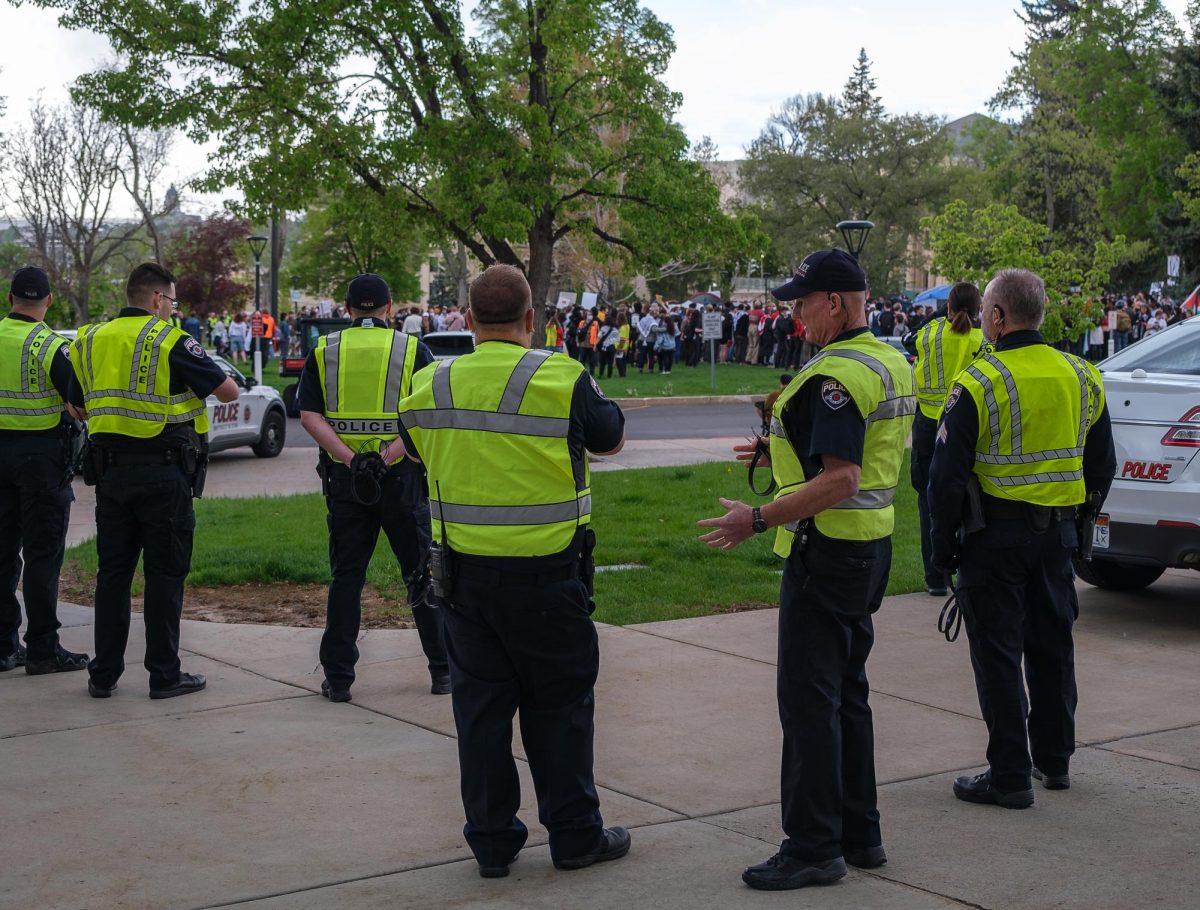On Nov. 1, 2023, roughly 50 protesters crashed an on-campus watch party hosted by Young Americans for Freedom at the University of Utah. Mecha, a socialist student organization, led the protest. The demonstration ended with police escorting protesters — and later YAF members — out of the viewing room. Later that month, Mecha was notified that its university sponsorship had been withdrawn. In early December, police issued citations to seven protesters.
According to an article released by the U’s Campus Safety team on May 31, Mecha’s actions at the Nov. 1 protest led the U to increase police presence at subsequent events involving Mecha. It also later informed police response to a pro-Palestinian encampment led by Mecha the night of April 29.
The YAF Watch Party Protest
Mecha did not communicate their plans with the University Police or any other student service. The article claims that during the protest, protesters locked arms and blocked officers from exiting the room. Later, “someone put their hands on an officer, requiring officers to physically move the protesters to exit.”
The article details that officers canceled YAF’s event and escorted its members out of the room for fear of their safety. This, however, created another problem because YAF’s “First Amendment-protected event was interrupted.”
“The lack of communication, combined with a display of criminal behavior, were significant signs,” the article reads. “Not wanting a repeat of the incident, for subsequent protests involving MEChA, the University of Utah Department of Public Safety increased its presence.”
The article explains how U Chief Safety Officer Keith Squires requested assistance from neighboring police agencies to respond to Mecha’s rally on April 29. Mecha’s protest history and a national wave of pro-Palestinian protests on university campuses motivated Squires’ decision.
“The best indicator of future behavior is past behavior,” U Police Captain Jason Hinojosa is quoted in the article. “Once we had that past behavior, it set the stage for everything we had to be responsible for.”
April 29 Encampment
Mecha’s rally on April 29 began with speeches and chants on the steps of the Park Building. Then, Mecha revealed it would establish a solidarity encampment for Gaza on the lawn of Presidents Circle. Protesters moved and surrounded Mecha organizers as they set up tents and continued making speeches.
Utah Administrative Code 805-3-3 does not allow camping on the U’s campus without prior approval from the University Scheduling Office. Yet protesters continued camping for several hours. The University Department of Public Safety then released a statement telling protesters to dismantle tents immediately. Otherwise, law enforcement would remove them. Around 10 p.m. that night, a police officer issued the demonstrators their first warning.
Officers from the Utah Department of Public Safety’s Public Protection Unit, created to respond to First Amendment-protected activities, were at the protest. A similar Salt Lake City Police Department unit, the Public Order Unit, was also present.
“The officers have special protective gear — helmets and shields — that they use when responding to an escalated situation in which they expect to receive physical contact,” reads @theU’s article. “In the approximately 40 times the Public Protection Unit has been deployed in and out of the state since 2020, the unit has only needed to don its full protective gear three times, one of which was April 29.”
Response in Riot Gear
Utah Department of Public Safety Lt. Corey Nye ordered the Public Protection Unit to wear protective gear after protesters brought pallets, boards and water bottles to their camp, “a sign that they could be used as projectiles,” according to the article. Protesters remained camped for another hour after the first warning was issued. Then, police in riot gear gathered in front of the Park Building.
“Water bottles, buckets, cans of food, rocks and other debris started flying in their direction,” the article claims.
“The officers moved slowly, walking forward, reforming ranks, and walking again,” the article described. “They identified protesters who were being unlawful, made arrests, and removed them.”
The article explains that before police cleared the encampment, university administrators handed protesters flyers with points on how to lawfully protest. University administrators reportedly attempted to deescalate the situation with student leaders.
The night led to 19 arrests, including four university students and one university employee.
“In what could have ended with a scene similar to those that played out at university campuses across the country — with tear gas, property damage and full-blown rioting — the protest at the U ended with misdemeanor arrests and three reports of minor injuries, including two police officers who were not wearing protective gear,” the article reads.




